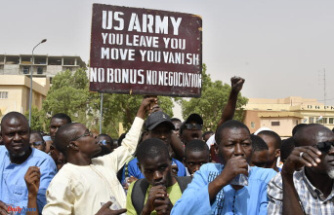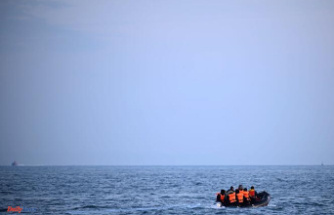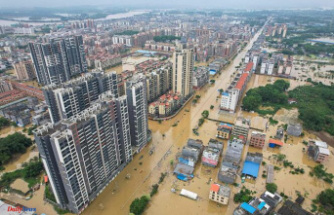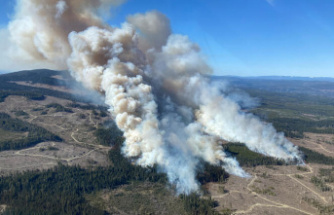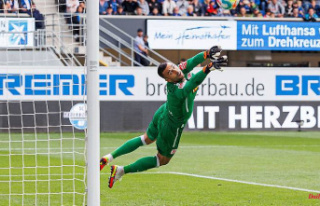Climb an eight-thousander with only a few weeks of preparation? An absurdity. But Cecily dares. She has to dare, because only after she has conquered the summit can she get an exclusive interview with the greatest mountaineer of all time. But a warning catches her eye.
'Breathe Cecily!' Frosty air rushed into her lungs, and when she imagined what it would be like to breathe up here, she'd assumed it would feel like suffocation, like her throat tightening, maybe still like drowning somehow, but it was It wasn't... Basically, it was quite simple: There wasn't enough oxygen in the air, Barely a third of what her body was used to, According to the altimeter on her wrist, she was still over 8,000 meters - in the death zone. " Cecily is fighting for sheer survival in the death zone of Manaslu, one of the 14 eight-thousander peaks on earth.
This idea had been unthinkable for only a few months. The British travel reporter wrote her reports as a freelancer, made ends meet and was happily linked to her colleague James. It was he who got her into mountaineering. It was he who inspired her to do "Three Peaks", climbing the three highest mountains in Scotland, England and Wales within 24 hours. It was also he who had abandoned her, only in sneakers and unprepared, to the last of these three mountains, Snowden. And it was James who celebrated her as a heroine in an article afterwards - because Cecily, cold and exhausted, had waited for the mountain rescue service to rescue a fallen climber. Cecily a heroine? She herself had a completely different opinion, after all the woman was dead.
But it was precisely this tragic episode that was to change her life in one fell swoop: Charles McVeigh noticed her. He is the mountaineering icon of the present, an artist on the mountain, an exceptional talent. McVeigh has almost completed his current project to climb all 14 of the world's eight-thousanders unaided. Only Manaslu is missing, the "Killer Mountain". And for this final act of his record-breaking tour, he has promised Cecily his first ever exclusive interview. It would be her breakthrough as a travel journalist, after which she could choose her jobs. But the deal has a catch: Cecily has to go to the top of Manaslu. If she succeeds in storming the summit, she gets her scoop.
In a way, this is the base camp from which Amy McCullochs lets the protagonists of her thriller "The Ascent - Death Waits in Icy Heights" start. But a thriller also includes a few deaths, a few twists, moments of goosebumps. And spoiler alert: yes, it's all there. And much more. Already in the base camp there is the first death. A skilled climber, Cecily knows because she was the last person to see him alive. He was on a mission, wanted to pay his last respects to a friend who had died in a summit storm - and clarify his mysterious death. He suspects a murder. But he can no longer follow up on suspected traces.
A dead already in the base camp? Not a good omen for her ascent of Manaslu, Cecily thinks. Then she finds a warning on her equipment: "A murderer is on the mountain, get to safety!" But she can't just quit. Without a story, she could quit her job - and she'd be broke on top of that. So, together with a small group - a tech investor, an influencer, a filmmaker and an experienced but previously fired mountain guide - Cecily begins the ascent. There are four camps to the summit, several times it goes from one camp to the other and back again, so that the climbers' bodies get used to the altitude and the air conditions.
Cecily, initially plagued by self-doubt because nobody believed her capable of climbing Manaslu, learns new things, fights her way into mountaineering and gains mental strength. But there are more dead: from another group, an experienced Russian mountaineer dies on the "hanging wall", strangled in a rope. The mission still goes on. Apparently, death is part of projects like this: when people push their limits, accidents cannot be ruled out. Only that Cecily has more and more doubts that it was an accident.
In the few hours that she has to recover from the hardships of acclimatization, she begins to research herself, to ask questions, to bring light into the darkness. But that doesn't go down well with everyone. Is there really a murderer on the mountain or is the mountain the murderer? The nickname "Killer Mountain" isn't a coincidence, is it?
McCulloch's "The Rise" invites you to become part of a human borderline experience. Many people would like to climb an eight-thousander, but only a few fulfill this dream. "The Rise" helps everyone to be there almost live. To experience what it really means to survive in the death zone - a zone where human cells are dying every second, where hallucinations are the rule rather than the exception, where body and mind can go astray dangerously. As a reader of "The Climb" you can experience how much preparation goes into such a tour before you can even climb the summit. How quickly everything can be over: the wrong weather, a misstep, a lack of concentration, a defective piece of equipment.
With her thriller, McCulloch succeeds impressively because, as a layman, one is immediately drawn to the subject. The author gently takes her readers by the hand without neglecting the plot. In a way, she becomes a mountain guide, briefly passing on her own experiences and knowledge.
It remains to be seen whether Cecily will ultimately succeed in conquering the Manaslu and returning safely to the base camp - more climbers die on the descent than on the ascent. Also whether it is possible to successfully master such a tour with only a few months of preparation. But as a reader, after reading it, you definitely feel like exploring your own limits again.


